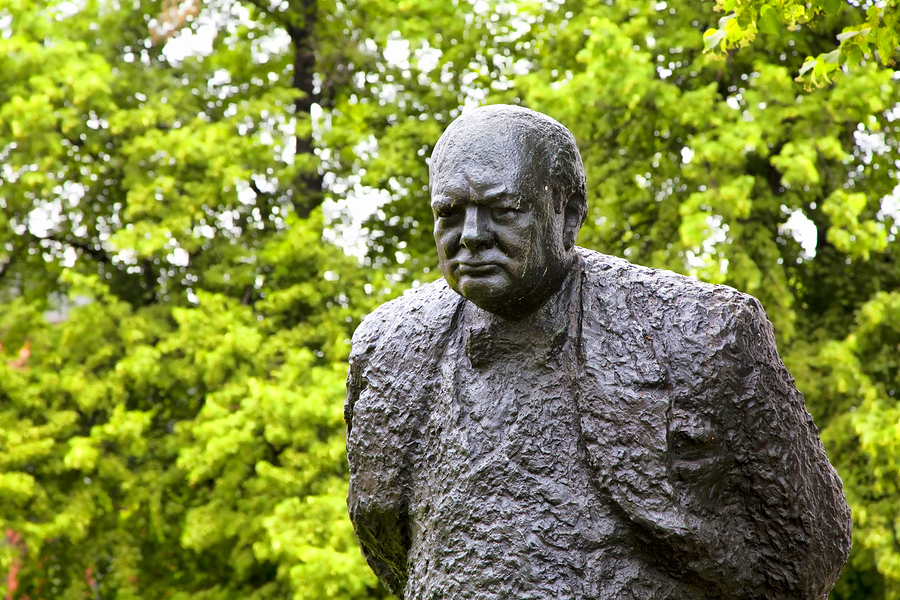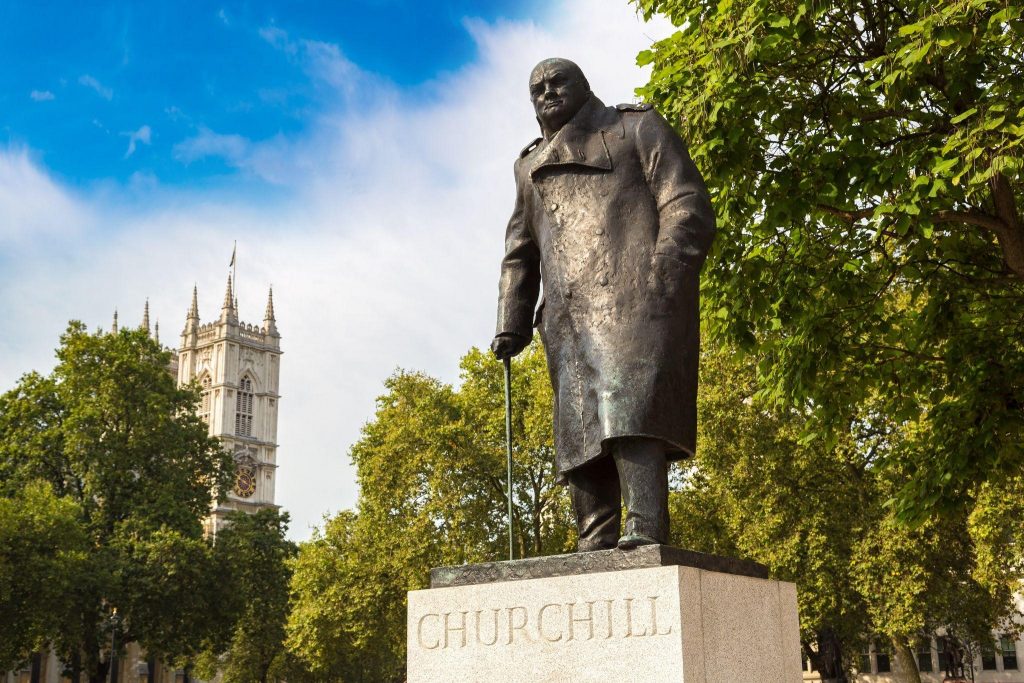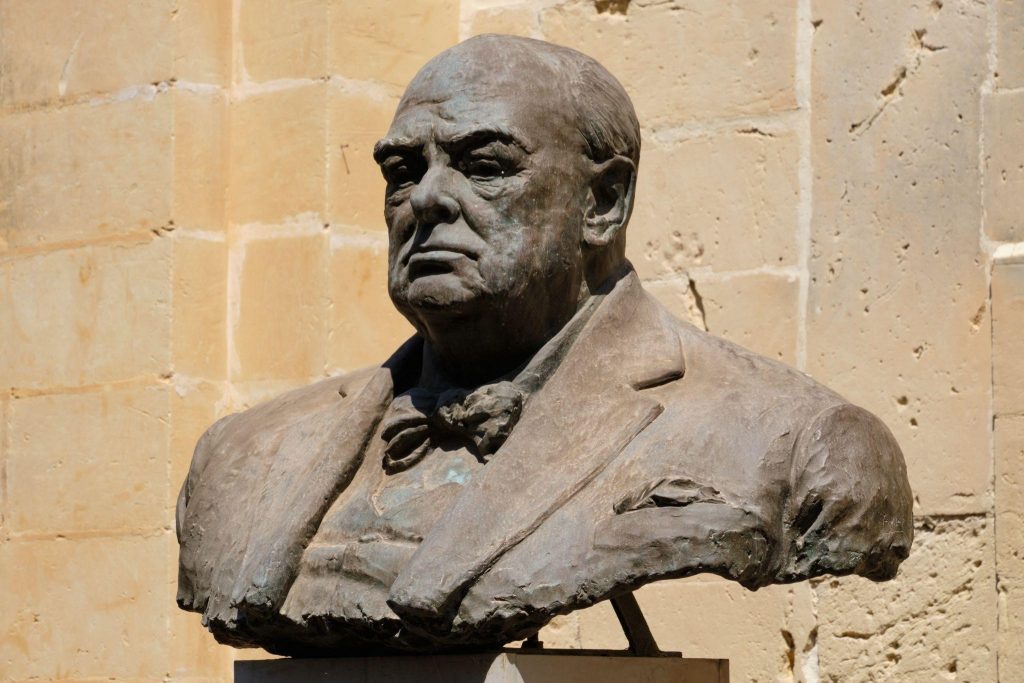THE WORLD’S #1 EXECUTIVE COACHING AND BUSINESS COACHING BLOG SINCE 2017.
Winston Churchill Leadership Style: Pioneering Authentic Leadership for Modern Executives
March 28, 2025 | Category: Blog, Intelligent Leadership | Last updated on: June 3, 2025

Throughout history, a select few leaders have risen to face extraordinary moments with uncommon strength, character, and clarity. Sir Winston Churchill stands among the most influential and revered of them all. As the Prime Minister who led Britain through its darkest hours during the Second World War, Churchill’s leadership transcended politics—becoming a global symbol of courage, authenticity, and visionary resolve.
Why study Churchill today, almost a century after World War II? Because leadership is a timeless discipline.
As modern executives, we are not the first to face uncertainty, complexity, or crisis. We gain invaluable guidance by looking to the past and learning from history’s greatest leaders. Churchill reminds us that leadership rooted in character, conviction, and service is possible and necessary. His example teaches us that great leaders are forged in adversity, refined through reflection, and defined by the legacy they leave behind.
Sir Winston Churchill demonstrated outstanding crisis leadership. Few leaders, if any, in history surpassed him in this respect.
Understanding Sir Winston Churchill
Born in November 1874 into a wealthy family of British aristocrats, Winston Churchill’s life turned into a litany of academic, military, and political accomplishments from a relatively early age. A son of lord Randolph Churchill, a prominent British Conservative politician in the late 19th century, Sir Winston Churchill rose to become a Liberal MP in 1904.
He was the President of the Board of Trade in H.H. Asquith’s Government. His years of military service took him worldwide, and he started writing as a war correspondent.
By the time he became the Prime Minister of the United Kingdom in May 1940, he had accrued plenty of political experience and strategic prowess. His leadership qualities would serve his nation well.
His tenure came at a time when an increasingly bellicose Nazi Germany invaded France and threatened to attempt the invasion of Britain. By providing an ironclad example of determination, Churchill inspired his nation to resist the seemingly unstoppable advance of the Axis powers.
He coordinated the global war effort, working closely with Franklin Delano Roosevelt of the United States and Stalin of the Soviet Union. He contributed to shaping the post-war global order with the other victorious world leaders.
His leadership was instrumental in defeating the Nazi war machine and overcoming the challenges these extraordinary times delivered upon the British people.
Churchill’s Approach to Leadership: Charisma, Character, and the Journey of Becoming
Sir Winston Churchill belongs to a rare class of leaders whose presence could captivate a room—or an entire nation. His charismatic leadership traits enabled him to rally people in the face of immense adversity, to deliver speeches that electrified a weary public, and to embody the unwavering spirit of a nation under siege.
But charisma alone does not make an extraordinary leader. As I teach in Intelligent Leadership, character, not charisma, is the cornerstone of sustained, meaningful leadership. Charisma may draw people in and open doors, but character and consistency build trust, influence, and legacy. Churchill’s character and commitment to becoming his best version allowed him to lead with enduring impact.
How serious Churchill was about improving himself cannot be overstated. Churchill’s rise to greatness was not effortless—it was intentional. He was not born with the fully formed skills we now associate with him. Many of his most defining leadership traits were the result of deep personal work:
- Not a natural orator: Churchill overcame early struggles with speech and articulation. He studied great speeches, practiced relentlessly, and rehearsed every word to develop his famous delivery.
- Resilience was cultivated: He endured political failures, military criticism, and long years in the political wilderness. Rather than retreat, he used these moments to reflect and strengthen his leadership resolve.
- Churchill took self-development seriously: He read extensively, wrote prolifically, and worked tirelessly to improve his understanding of war strategy, governance, and communication.
- He understood the power of preparation: Churchill was rarely spontaneous in public—his speeches and decisions were the product of disciplined thought, not flair.
- He chose to lead with authenticity: Churchill never masked the gravity of the war. His honesty and transparency created trust, even in the most terrifying circumstances.
“Success is not final. Failure is not fatal. It is the courage to continue that counts.” – Winston Churchill
His approach reflects one of the foundational truths of Intelligent Leadership: Leaders are not born but made through consistent, conscious development of their inner core—character, values, beliefs, and self-concept—and outer core competencies such as critical thinking, decision-making, strategic thinking, emotional intelligence, communication skills, talent leadership, team leadership, change leadership and drive for results.
Winston Churchill and His Leadership Qualities
In addition to his unparalleled resilience and oratory skills, Churchill embodied an impressive range of admirable leadership qualities.
- Decision-making under pressure. One of Churchill’s leadership superpowers was taking risks and making bold decisions for the common good.
- Outstanding diplomacy. Navigating a landscape of allies as disparate as the US and the Soviet Union was an impressive balancing act from British diplomacy.
- During his 1940-1945 tenure as prime minister, Churchill decided against the combined headwinds of military challenges, political opposition, and diplomatic intricacies.
- Long-term strategic vision. Beyond winning the war, Churchill envisioned establishing a world order to ensure lasting peace.
- Adapting and learning. Churchill understood the value of failures as learning opportunities and took full advantage of them.
Winston Churchill’s leadership style is founded on his unwavering determination, ability to engage audiences through inspiring rhetoric, and strategic foresight, which allowed him to make outstanding decisions.
As one of the greatest wartime leaders in history, Churchill’s historical persona may not conjure up images of servant leadership. Yet his service to his nation was invaluable through the direst of times.
Winston Churchill and Intelligent Leadership
The Winston Churchill leadership style is one of history’s most powerful examples of Intelligent Leadership in action. During the Second World War, Churchill emerged not only as a wartime Prime Minister but as a symbol of resilience, authenticity, and strength of character. His ability to lead through crisis, inspire through words, and act with moral conviction wasn’t the result of raw talent—it was the product of serious, deliberate personal development.
Long-term leadership success comes from aligning who you are (inner core) with what you do (outer core). Churchill lived this alignment. He didn’t separate values from action. He embodied them—even when the stakes were life and death. What makes Churchill an Intelligent Leader is not just what he achieved—but how he achieved it:
- He strengthened his inner core through reflection, self-discipline, and resilience.
- He developed his outer core by honing essential leadership skills.
In Intelligent Leadership, we believe that becoming your best as a leader and a human being starts with the inner journey. Churchill’s story is a masterclass in that truth. His leadership was not perfect, but it was profoundly authentic, grounded in a deep sense of duty, and fueled by a relentless pursuit of personal growth. Churchill’s World War leadership is more than history—it’s a leadership manual for today’s executives navigating complex, high-stakes environments.
Authenticity and Character
I believe authenticity, character, and a focus on personal growth are the cornerstones of successful, inspirational leadership. At the heart of these qualities lies leadership maturity—the internal strength that enables leaders to remain grounded in their values, even under immense pressure. Leadership maturity transforms authenticity into influence and personal growth into lasting impact.
Like Winston Churchill, mature leaders are resilient. They know that no success is final. And failure is nothing more than a lesson—or an opportunity to bounce back stronger.
Winston Churchill’s authenticity was unquestionable in every aspect of his leadership. His strong convictions and values provided a solid foundation for his inspirational speeches, writings, and wartime decisions. Some other ways in which he demonstrated authenticity were:
- Honest and transparent communication. Churchill refrained from sugarcoating the challenges his country faced during the war.
- Leading by example. Winston Churchill wasn’t afraid to put his life on the line and share the burden of the war with those he led.
- Witty humor. He could inject well-measured humor into the direst situations.
- Outstanding communication. Churchill was not a born communicator. Yet, with an intentional focus on improving the quality of his communication, he achieved superb eloquence and a passionate delivery that never failed to electrify his audience.
- Even in the darkest days of the war, when Britain faced the Nazi threat alone, he made it clear that his nation would never surrender.
During the early days of his tenure, Churchill was under immense pressure to negotiate with Hitler. He never gave into the pressure, steadfastly refusing to engage the Nazis in direct dialogue.
In the context of intelligent leadership, Churchill’s approach to leading a nation through its direst straits provided a model of mature, determined, and mindful leadership. He understood the odds and the risks involved and navigated the challenges as a true crisis leader. He remained authentic, allowing his character to be his primary source of guiding values.
Churchill’s Path to Leadership Maturity
Churchill’s life was a litany of more or less dangerous escapades and learning experiences. He crammed much more action and adventure into his life than average people. And he kept an open mind throughout it all.
He took in his experiences with humility and a persistent willingness to learn from his mistakes. He was highly adaptable, choosing to express himself and refine his ideas through reading and writing.
No stranger to failure, Churchill advocated opening a second front against the Ottomans by taking the Dardanelles in World War I. As a result, he was responsible for the subsequent disasters of the campaign. This experience triggered deep self-reflection, prompting him to reconsider his responsibilities and decisions.
During the 1930s, Churchill experienced a period of political failures and isolation. Even during this time of political wilderness, he remained true to his principles. He continued to warn against appeasing the Nazi regime and allowing fascism to gain ground in Europe.
The Gallipoli campaign was a disaster for all sides involved.
Lessons for Today’s Business Leaders
The principles of intelligent leadership are timeless and valid under varying circumstances. Churchill’s leadership principles offer guidance and countless lessons to today’s business leaders. Here are a few actionable principles leaders can use to improve their leadership and build deep reservoirs of positive leadership references.
- Excellent communication is one key aspect of successful leadership. All successful leaders are master communicators.
- Courage and conviction. Some leadership values may be malleable under the influence of self-reflection and accumulating wisdom. Others are non-negotiable. Successful leaders assume the burden of their convictions even if they invite criticism and scorn from others.
- Risk-taking and strategic vision. Intelligent leaders take calculated risks in pursuit of a compelling vision they can use to inspire others.
- Ethical conduct. Churchill recognized the importance of ethical conduct in building trust and succeeding as a leader.
- Self-reflection and self-awareness are two of the cornerstones of leadership success. Only self-aware leaders can identify authentic ways to inspire, help, and develop their followers. Leaders who constantly reevaluate their values and principles with a critical eye can continue to improve.
The parallels between Winston Churchill’s leadership and Intelligent Leadership are too obvious to miss. Many of history’s great leaders discovered and applied leadership principles that worked long before researchers dissected, identified, and revealed these principles to the masses.
Applying Winston Churchill’s Wisdom
Some elements of Winston Churchill’s leadership success are impossible or difficult to replicate. Although he was a learned man, his education was self-directed. Unconstrained by the shackles of conventional thinking, “out-of-the-box” reasoning was his default way of thinking. He was a master of deep insight, an ability that often trumped his judgment.
Other aspects of his leadership success may be easier to recreate. Values-driven leadership has always been a prerequisite for success. And Churchill knew his values. He practiced leadership as a duty and a deliberate reflection of who he was at his core. Among the key leadership traits he modeled were:
- Inclusive leadership – Churchill united opposing political voices to form a unified wartime government. Intelligent leaders foster inclusion by valuing diverse perspectives and aligning people with a shared mission.
- Strategic vision – Churchill looked beyond the battlefield to envision a peaceful, post-war world. Strategic vision in leadership means anticipating the future and inspiring others to pursue it with clarity and purpose.
- Effective communication – Though not a natural orator, Churchill became one through relentless preparation and intentional growth. Intelligent leaders know that powerful communication stems from authenticity and alignment with core values.
- Ethical conduct: Churchill stood firm on the principles of freedom and justice, even under immense pressure. Ethical leadership builds trust, which is the foundation for lasting influence.
- Courage – Churchill made bold, unpopular decisions because he believed they were right. Intelligent leaders demonstrate courage by facing hard truths and acting with conviction.
- Personal growth and continuous improvement – Churchill read, wrote, reflected, and learned throughout his life. Great leaders never stop growing—they pursue excellence through self-awareness and ongoing development.
- Leadership integrity – Churchill’s decisions consistently reflected his values and moral compass. Integrity is the glue between a leader’s inner beliefs and outer actions—it’s what earns enduring respect.
These principles are not always easy to master. Still, leaders willing to self-reflect and gain clarity on their leadership strengths and weaknesses can intentionally develop them.
Intelligent Leadership Executive Coaching: Transforming Potential into Legacy
Winston Churchill’s leadership legacy teaches us that great leaders are forged—not born—through adversity, intentional growth, and the courageous alignment of values and actions. His example offers a clear call to action: leadership excellence requires a commitment to inner-core development and outer-core mastery.
At John Mattone Global, our Intelligent Leadership Executive Coaching is designed for leaders ready to take that call seriously.
We help executives uncover and strengthen their character, values, and emotional maturity while refining their leadership, communication, emotional intelligence, strategic thinking, and decision-making capabilities.
Churchill’s journey reminds us that leadership is a choice—and transformation is possible. Through a structured and proven coaching process, we guide leaders to build their inner strength, elevate their outer skills, and create a lasting legacy of trust, service, and impact.
Conclusion: Becoming the Leader the Moment Demands
Winston Churchill’s leadership style continues to resonate across generations because it was built on principles that transcend time: character, resilience, courage, and commitment to growth. Studying his life reveals that great leaders are shaped by challenges, refined by deep introspection, and sustained by a clear sense of mission.
In an era where complexity, change, and crisis define the business landscape, Churchill’s example reminds us that leadership rooted in authenticity and values will always rise above the noise. As leaders, we all face our battles. But like Churchill, we can rise—when we choose to grow.
At John Mattone Global, we help leaders embark on this transformative journey. If you’re ready to develop your leadership maturity, align your inner and outer core, and become the best version of the leader you’re meant to be, book your complimentary strategic session today.





